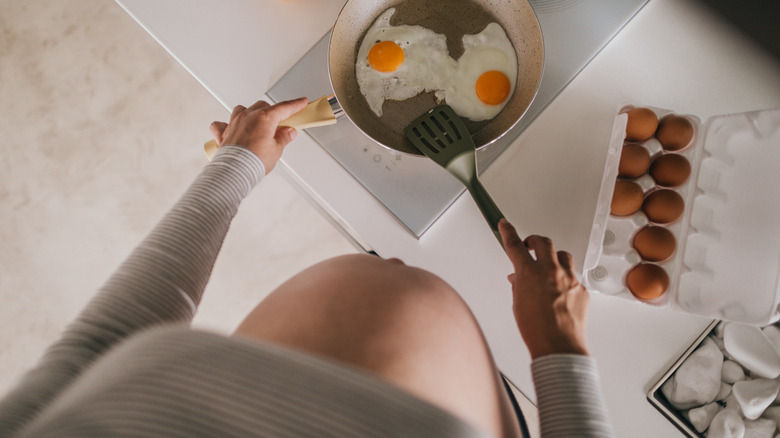Is Diarrhea A Sign Of Impending Labor?
When it's time to go into labor, most people know what is to come in the next few hours to bring their bundle of joy into the world. In other words, they're prepared for the pain that comes with the contractions, which eventually start to be consistent when it is really time for labor, their water breaking, and the feeling of more weight on the bladder, indicating the baby is positioning itself to come on out, according to the experts at Healthline.
In addition, an increase in discharge is also a sign that labor is coming. However, this type of discharge pertains more to segments of your cervical mucus plug coming out and is usually done a few weeks before being in the hospital for labor. That being said, some may be wondering if diarrhea can be included as a sign of labor. Here's what to know regarding diarrhea and getting ready for delivery.
Diarrhea and delivery
If you're one to experience diarrhea, don't be alarmed, as it is a sign of incoming labor, as per What to Expect. Like with other symptoms of labor, you'll want to take it easy with your body. After all, it's about to go through a whirlwind of feelings. The diarrhea experienced prior to giving birth is brought on by, you guessed it, your hormones. Before delivery, they too, are making sure your body is ready to go. To do so, muscles in the body and the anus loosen up.
Once you start having diarrhea, delivery is supposed to initiate within the next two hours (per Medicine Net). Nevertheless, keep in mind, this isn't always the case, as diarrhea can be brought on by a number of other things. In any case, it's best to mention it to the doctor to make him or her aware of all the signs. Plus, you'll want to stay hydrated regardless. While you can't control diarrhea if it's a sign of labor, you can control it if it's being caused by the foods you consume.
Foods to avoid while pregnant
In order to avoid diarrhea while pregnant, it's simple — steer clear of foods that are prone to move your stomach, like prunes (via What to Expect). Whether you're pregnant or not, these bad boys can lead to an upset stomach. But along with prunes, while expecting, avoid spicy foods, milk, fried and fatty foods, beans, broccoli, peas, and chickpeas, along with any dairy products keeping your stomach in motion.
Instead, you can try incorporating more potatoes, crackers, cooked carrots, eggs, and acorn squash, among other foods. However, before making any drastic changes to your diet, it's always best to run any modifications by your doctor. That way, you're both on the same page if any side effects do arise before or during labor, especially if you're curious to start going on any medications for your diarrhea. That being said, if your stool doesn't improve within 48 hours, be sure to seek medical attention promptly.



